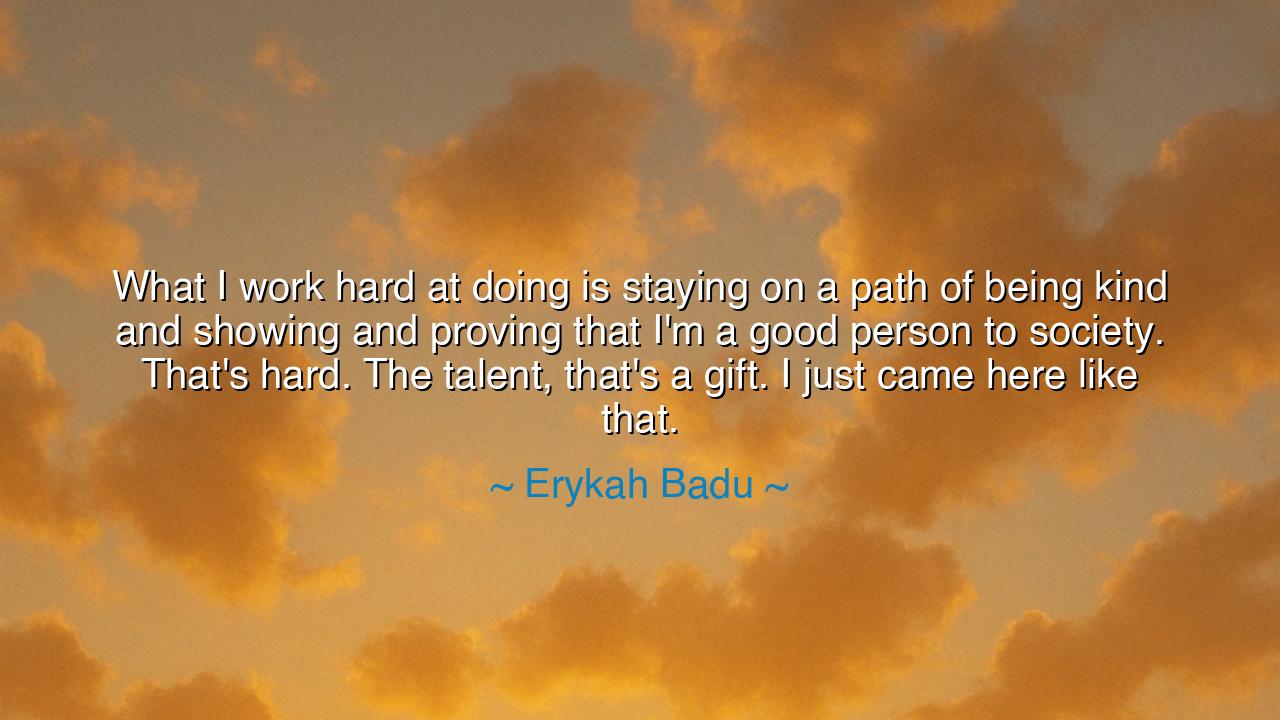
What I work hard at doing is staying on a path of being kind and
What I work hard at doing is staying on a path of being kind and showing and proving that I'm a good person to society. That's hard. The talent, that's a gift. I just came here like that.






Erykah Badu, the high priestess of soul and seeker of truth, once spoke with a wisdom that transcends the glitter of fame: “What I work hard at doing is staying on a path of being kind and showing and proving that I’m a good person to society. That’s hard. The talent, that’s a gift. I just came here like that.” These words are not merely about art or music—they are about the human struggle to live rightly, to walk the earth with integrity. For she reminds us that talent may dazzle, but character is the true measure of a life.
The meaning of her statement is sharp and humbling. Talent is bestowed by fate, or by the hand of the divine—it arrives unasked, like the rain or the wind. One may nurture it, yes, but its root is a mystery. What is difficult, what requires effort, is not the gift itself, but the daily labor of the heart: to remain kind, to choose goodness in a world that tempts the soul with selfishness, pride, and anger. Erykah Badu confesses what many forget—that greatness lies not in the stage, but in the hidden choices of the spirit.
History gives us vivid confirmation of this truth. Consider the Roman general Marcus Aurelius, emperor of vast dominions. His talent for leadership and philosophy was clear, but what set him apart was his relentless discipline in remaining just, compassionate, and mindful, even when surrounded by war, plague, and treachery. His Meditations reveal a man who knew that power and skill were gifts, but that the hard path was to stay rooted in virtue. Like Badu, he understood: the challenge is not in what one receives, but in what one continually chooses.
Likewise, in the story of Mahatma Gandhi we see the same principle. Gandhi possessed the natural talent of speech and persuasion, but his true greatness came from his tireless kindness and discipline of soul. He trained himself to live simply, to respond to violence with peace, to serve even those who despised him. His influence grew not from the gift he was born with, but from the hard work of embodying goodness in society, even when it demanded suffering. In him we see that talent may inspire admiration, but character inspires transformation.
Erykah Badu’s words are also a critique of our times, where society often worships the gift but neglects the giver’s heart. We raise idols for their voices, their wealth, their beauty, but forget to ask: are they kind? Do they walk the path of the good person? And we do the same in our own lives, taking pride in our skills while neglecting the harder task of humility, patience, and love. Her reminder calls us back to the ancient truth: that what we are matters more than what we can do.
The lesson is clear and enduring: cherish your talent, but do not mistake it for virtue. Work harder at the invisible work of the soul than at the visible work of performance. Strive to be known not only for what you create, but for the gentleness and honesty of your dealings. For in the end, society will remember less the songs you sang or the trophies you won, and more the kindness you gave, the dignity you upheld, and the light you carried in dark times.
Practical action lies in small, daily steps. Practice kindness not only toward friends but toward strangers. Resist the temptation to prove yourself through display, and instead prove yourself through compassion. When your talent opens doors, walk through them with humility, remembering that gifts are not earned but entrusted. And when the path of goodness feels hard, take heart, for it is the hardest roads that lead to the highest places.
So let Badu’s words echo within you: the talent may be a gift, but the true labor is to remain kind, to be a good person in the eyes of society, even when it costs you pride or comfort. Do this, and your life will not only shine with the brilliance of talent, but with the eternal light of virtue—an inheritance greater than fame, and a legacy that no time can erase.






AAdministratorAdministrator
Welcome, honored guests. Please leave a comment, we will respond soon